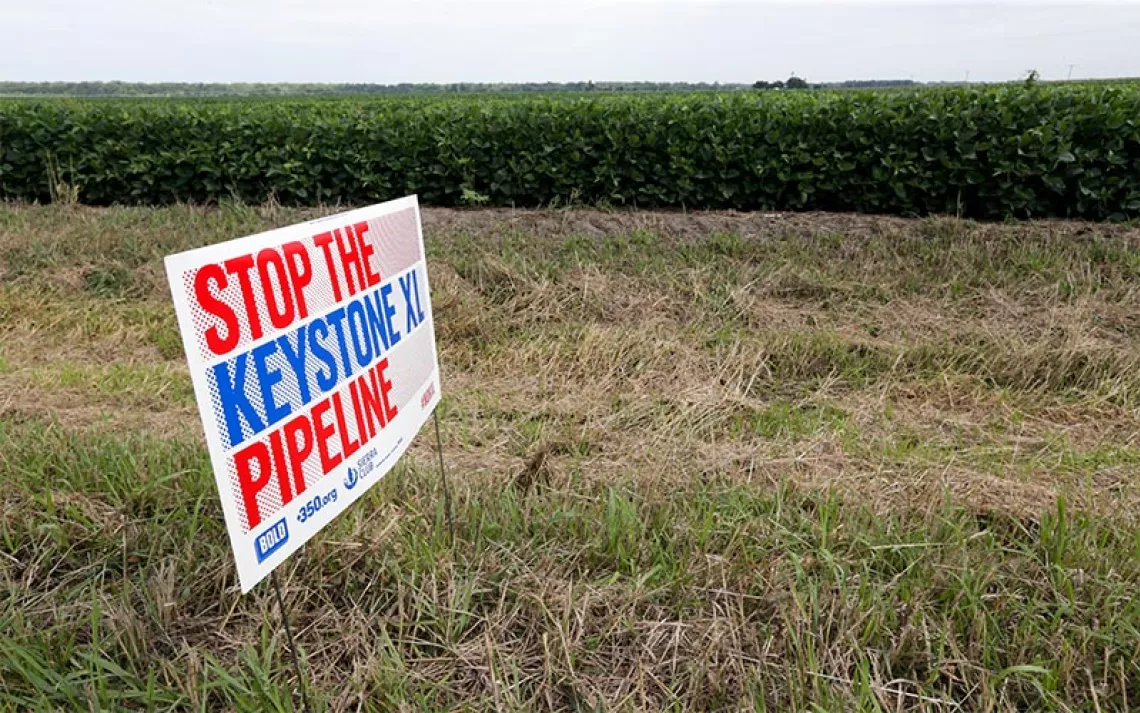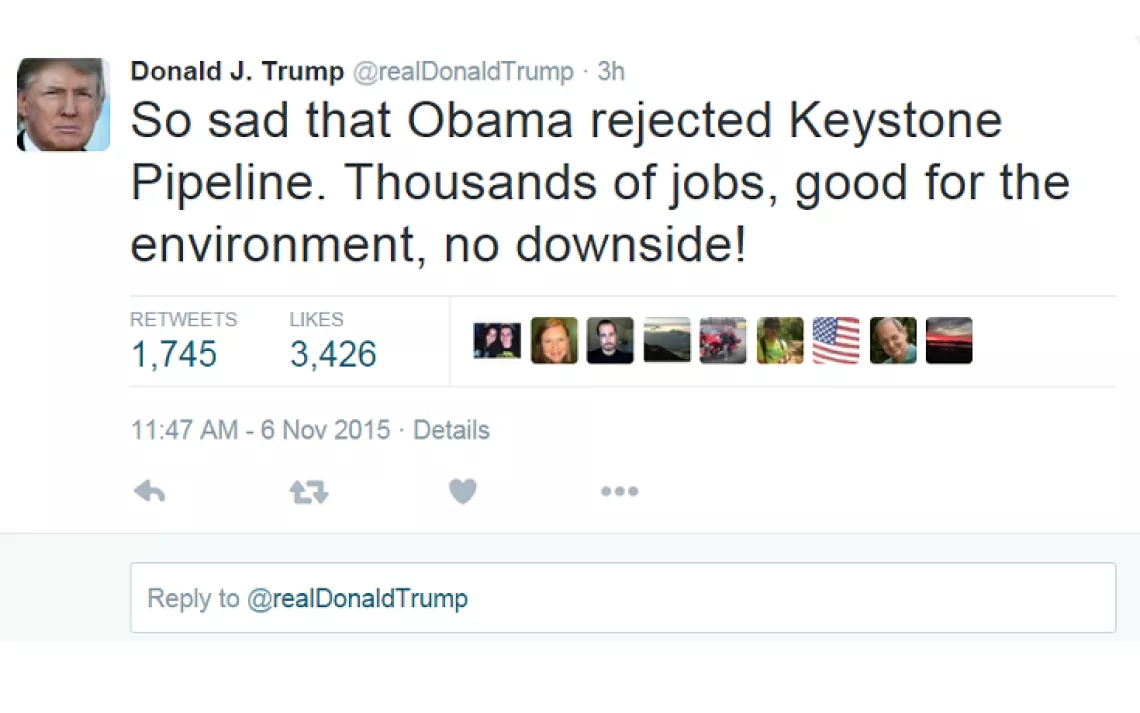Keystone XL Victory: To Win a Fight, You Have to Pick One
Obama’s pipeline rejection a huge win for citizen action

Photo by J. Sierra/Sierra Club
President Barack Obama’s rejection of the Keystone XL tar sands pipeline marks one of the biggest victories for the U.S. environmental movement in years. Speaking this morning from the White House, Obama–flanked by Vice President Joe Biden and Secretary of State John Kerry–made one of his most forceful statements to date about the importance of moving the U.S. economy away from fossil fuels.
“Shipping dirtier crude oil into our country would not increase America’s energy security,” the president said. “America is now a global leader when it comes to taking serious action to fight climate change. And frankly, approving this project would have undercut that global leadership.”
Then, in a clear echo of the environmental movement’s overarching message, the president said, “Today, we're continuing to lead by example, because ultimately, if we're going to prevent large parts of this earth from becoming not only inhospitable but uninhabitable in our lifetime, we're going to have to keep some fossil fuels in the ground rather than burn them and release more dangerous pollution into the sky.”
Make no mistake: You never would have heard Obama say “keep some fossil fuels in the ground” had the environmental movement not made Keystone XL one of the defining issues of his presidency.
Coming after years of protests, marches, civil disobedience actions, and nonstop political pressure from both the grassroots and the Democratic party’s major donors, the defeat of the pipeline is a clear win for the environment. The president’s decision removes a potential threat to the Great Plains’ groundwater. It stems the sludgy tide of Canadian tar sands, an especially dirty source of crude oil that would, if fully extracted, accelerate global climate change.
Just as important, the pipeline’s defeat represents a major victory for the ideal of citizen action. “People power” is an overused and almost hackneyed phrase. But in this case, nothing else explains how such a political victory happened.
Just four years ago, many Washington insiders presumed that Keystone XL was a done deal. But Native American tribes, ranchers in the Great Plains, and environmental organizations ignored the conventional wisdom and decided to make Keystone XL a symbol for the choices we face in the era of climate change: Will we continue with the anachronistic fossil fuel economy, or make a pivot toward a society powered by clean energy? As author-activist Bill McKibben got in the habit of saying, Keystone was a “line in the sand.” The cynical “wise men” in Washington said the campaign against Keystone XL was quixotic, if not misguided. (Just see here, here, and here.) In the end, they were proven wonderfully wrong. The president’s decision proves that–even in a money-soaked and lobbyist-chocked political system–ordinary citizens can frustrate the best-laid plans of the powers-that-be.
When Bill McKibben, climatologist James Hansen, and 350.org latched onto the proposed project as a litmus test for the Obama administration’s willingness to be aggressive on climate, hardly anyone in the United States had heard about the proposed oil project. Then in August 2011, hundreds of people were arrested at the White House as they called on the president to reject the pipeline. Established environmental groups like the Sierra Club and NRDC jumped on board. Bigger protests followed, including a November 2011 encirclement of the White House involving thousands of people. In February 2013, Sierra Club executive director Michael Brune and then Club president Allison Chin were arrested at the White House, marking the first time the Club had engaged in nonviolent civil disobedience. Some 35,000 people converged on Washington for the “Forward on Climate” rally, demanding that the president reject the permit.

Make every day an Earth Day
Get articles like this one sent directly to your inbox.
With this action you affirm you want to receive Sierra Club communications and may vote on policy designated by the Sierra Club Board.
Meanwhile, on the Great Plains, TransCanada’s heavy-handed tactics sparked a populist backlash against the project. The organization Bold Nebraska, led by the tireless Jane Kleeb, helped bring together politically conservative ranchers and Native American tribes in Nebraska and the Dakotas to oppose the pipeline. By the time Nebraskans were booing TransCanada advertisements at a Cornhuskers football game, it was clear that the pipeline was in trouble.
Campaigners who have spent years fighting the pipeline naturally greeted today’s announcement with unmitigated joy. I reached 350.org executive director May Boeve just minutes after the president wrapped up his speech, and she told me that she had been crying as she watched the White House announcement. “I had to take a moment to realize that I didn’t know this was going to happen,” Boeve told me. “When we started working on this, we had no idea it would come. … Just a couple of years ago, insiders were saying this would be built, and here we are in 2015 and it’s been rejected. The conventional wisdom got turned on its head. There is no doubt there was skepticism … from the political insiders who don’t think that activism works. Hopefully now they will see things differently.”
The Keystone XL rejection proves a basic axiom of politics: To win a fight, you sometimes have to pick one. On Keystone XL, the environmental movement and its allies identified a powerful symbol of environmental destruction; framed the debate to put Big Oil on the defensive; did the hard work of grassroots organizing to put real pressure on the White House; and kept up the momentum even as Big Oil’s supporters in Congress tried to yank the issue in their direction. In the end, it all worked.
The Sierra Club’s first executive director, David Brower, often repeated a passage from the poet Goethe to describe his political instincts: “Seize this very minute / What you can do, or dream you can do, begin it / Boldness has genius, power and magic in it.”
On Keystone XL, the environmental movement demonstrated an impressive degree of boldness, a boldness that was fueled by citizen power and that will, thanks to this victory, open the way for more political power to come.
 The Magazine of The Sierra Club
The Magazine of The Sierra Club


